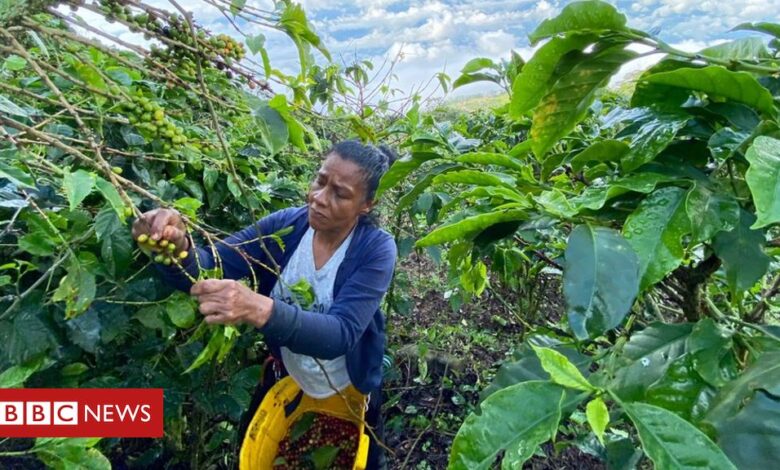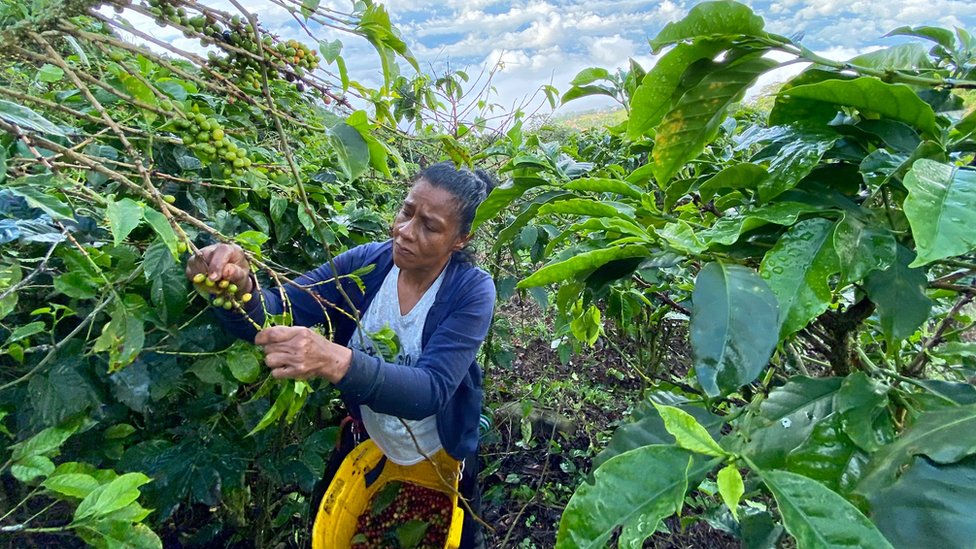No pickers, no coffee: How Covid threatens Colombia’s harvest

[ad_1]
By Manuel Rueda
Antioquia, Colombia

image copyrightSimon Echavarria
For almost four decades the Santa Isabel estate has been growing coffee and roasting it on its premises with machines powered by water and coal.
But production could fall this year at the massive farm, which covers a steep mountain that is almost entirely carpeted with coffee bushes.
Coffee pickers have become harder to hire amid the coronavirus pandemic. Low prices for beans mean there is not much money to lure more workers by offering higher wages.
“If we cannot get more workers we could lose some of our crop,” says Ángel García, the farm’s manager. “The beans will fall and rot on the ground,” he explained, as a crew of about 50 workers made their way up a slope covered in 6ft-tall (1.8m) bushes.
Santa Isabel – which has 900,000 coffee bushes – is one of many farms in the Colombian province of Antioquia that is struggling with labour shortages this year.
The province, home to the city of Medellín, needs around 32,000 coffee pickers from other parts of the country each year to collect its harvest, which takes place between September and December.
But it currently has a deficit of 7,000 coffee pickers, according to Colombia’s National Federation of Coffee Growers.
Similar labour shortages affected coffee farms in Costa Rica earlier this year.
More risk
Workers at the Santa Isabel farm say that fewer people are showing up because the job has become riskier.
“This place has workers that come from many different places,” said Luis Giraldo, a 40-year-old coffee picker.
“Even if you try to avoid contact with others, you really can’t,” he says, pointing to a group of a dozen workers who sit next to each other, chatting after having breakfast. None of them wore facemasks.
Mr Giraldo’s wife, Gloria Piedrahita, says she is happy to have a job. Her small clothing store in Medellín went broke earlier this year. But she also acknowledges there was a risk of getting infected with coronavirus.
“We have to sleep in dormitories here,” she explained. “And not all of the workers are careful.”
You may also be interested in:
To prevent outbreaks and make the job safer for coffee pickers, farms in Colombia have taken bio-security measures that include adding hand-washing stations and temperature checks.
Some of the larger farms have also expanded their dormitories or added tents so that their workers are more spaced out, with their bunk beds now placed two metres apart.
But the measures have not attracted as many workers as farmers had hoped for, even though the unemployment rate in Colombia is about 50% higher than it was a year ago.
Empty trucks
Mr García says that his farm usually hires 500 temporary workers to harvest its coffee bushes in November, when beans are ready to be picked. This year he has only been able to get 200.
Cold and rainy weather has slowed down the pace at which coffee beans mature in many parts of Colombia this year. That has helped Santa Isabel to stave off major losses. But the farm is still actively recruiting people, before its beans fall to the ground.
“We are putting ads on the radio, we are sending out a truck into town with a megaphone on it, offering to bring workers to the farm,” Mr García explains. “The truck often comes back empty.”
José Álvaro Jaramillo, the Antioquia director for Colombia’s Coffee Growers Federation, says the labour shortages have been happening for several years now – though to a lesser extent – as better paying industries like highway construction and the illegal coca crop lure rural workers away from the coffee fields.
Physically demanding and little security
Coffee pickers in Colombia are paid about $0.15 (£0.11) for every kilogram of beans they collect. On a good day an experienced coffee picker can make around $30 a day, gathering 200kg of beans.
It is three times as much money as what a worker on the national minimum wage makes. But the job is physically demanding and does not provide a fixed income or health insurance.
Fernando Morales de La Cruz, an expert on the coffee industry who directs the Café for Change Initiative, says that labour shortages will continue to be a problem until “the business model on which the global coffee industry operates is changed”.
Mr Morales de la Cruz points out that coffee currently sells for around $2.40/kg in global markets, or less than what it was selling for in 1983, when coffee-growing nations stopped imposing export quotas.
He says that a few companies – including Starbucks and Nestle – are purchasing most of the coffee in the world and keeping prices low thanks to their bargaining power.
For wages to improve significantly in the industry, wholesale prices for coffee beans would have to hover around $12/kg, Mr Morales de la Cruz, who is also a human rights activist, says. He argues that this big hike in prices could be covered, partly, by charging consumers an additional 10 cents for every cup of coffee bought at cafes or restaurants.
‘We can’t let the coronavirus scare us’
Still even as growers struggle with low prices for their coffee, there are people willing to work for the modest wages on offer.
At the Santa Isabel farm many of the coffee pickers who turned out this year are Venezuelan migrants, who need to send money to relatives at home. In Venezuela, the monthly minimum wage is currently worth around $1.
“We can’t let the coronavirus scare us” said Rafael Avendaño, a 25-year-old Venezuelan worker who has been at the farm for a month.
He had been living on Colombia’s Caribbean coast for three years working as a motorcycle taxi driver, but the pandemic put him out of business. “I’m more afraid of rolling down one of these slopes than of the pandemic” he joked.
“For people like us the priority is to work.”
You may want to watch:
Related Topics
[ad_2]
Source link





